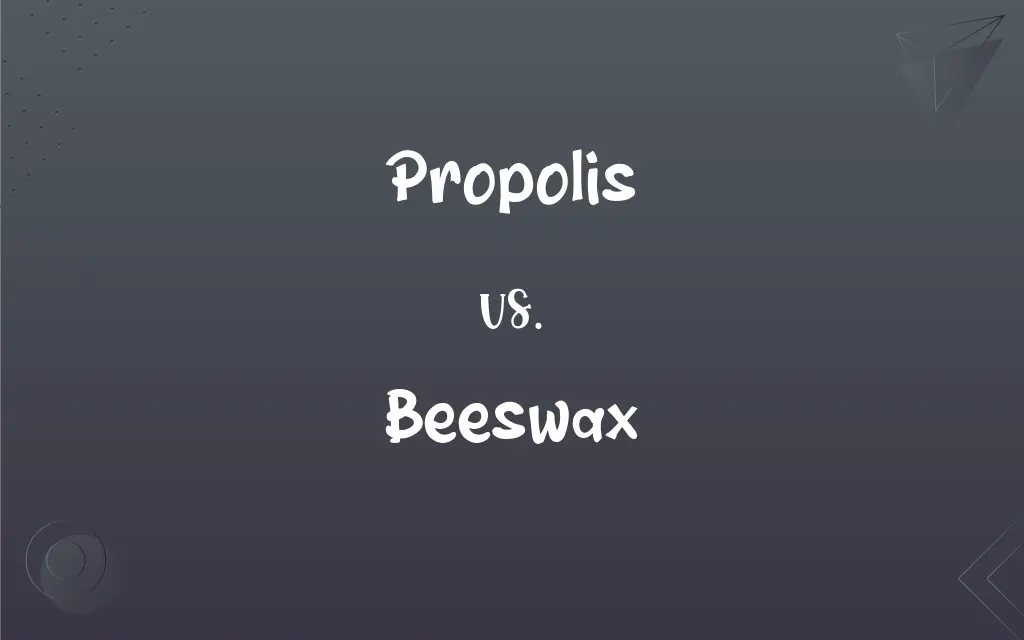Propolis vs. Beeswax: What's the Difference?
By Aimie Carlson & Janet White || Updated on May 29, 2024
Propolis is a resinous substance bees collect from plants, while beeswax is a wax produced by bees to build their hive structures.

Key Differences
Propolis, also known as bee glue, is a resinous mixture bees collect from tree buds, sap flows, and other botanical sources. Bees use propolis to seal cracks in the hive, reinforce the hive structure, and protect against pathogens due to its antimicrobial properties. Beeswax, on the other hand, is a natural wax produced by honeybees from specialized glands on their abdomens. Bees use beeswax to construct the honeycomb cells where they store honey, pollen, and brood.
While propolis has a sticky, resin-like consistency and a dark color, beeswax is solid, pliable, and usually yellow or white. Propolis tends to have a strong, distinctive scent, whereas beeswax has a mild, honey-like fragrance. The primary role of propolis in the hive is protective and structural, while beeswax serves as the primary building material for the hive.
Propolis is often harvested by scraping it from hive parts, while beeswax is collected during honey extraction. Propolis is more commonly used in health and wellness products for its potential medicinal properties, while beeswax is a key ingredient in manufacturing processes and personal care products.
Comparison Chart
Source
Collected from tree buds, sap flows
Produced by bees from abdominal glands
Primary Use in Hive
Sealing cracks, antimicrobial protection
Building honeycomb cells
ADVERTISEMENT
Consistency
Sticky, resinous
Solid, pliable
Color
Dark brown to greenish-brown
Yellow to white
Common Uses
Health supplements, topical treatments
Candles, cosmetics, food coatings
Propolis and Beeswax Definitions
Propolis
Used by bees to seal gaps and protect the hive.
Bees use propolis to keep their hive free from bacteria and fungi.
Beeswax
Used by bees to construct honeycomb cells.
Bees form honeycomb cells from beeswax to store honey and pollen.
ADVERTISEMENT
Propolis
A resinous substance collected by bees from tree buds.
The beekeeper collected propolis from the hive frames.
Beeswax
A natural wax produced by honeybees.
Beeswax is harvested during the honey extraction process.
Propolis
Known for its antimicrobial properties.
Propolis is often included in natural health products.
Beeswax
Widely used in cosmetics and food products.
Lip balms and lotions often contain beeswax for its moisturizing properties.
Propolis
Used in traditional medicine for its healing properties.
Propolis extract is believed to help with sore throats and infections.
Beeswax
Produced from glands on the abdomens of worker bees.
Beeswax production increases during the peak honey flow season.
Propolis
A mixture of saliva, beeswax, and botanical resins.
Propolis has a sticky texture and a strong scent.
Beeswax
The yellow to grayish-brown wax secreted by the honeybee for constructing honeycombs.
Propolis
A resinous substance collected from the buds of certain trees by bees and used as a cement or sealant in the construction of their hives.
Beeswax
Commercial wax obtained by processing and purifying the crude wax of the honeybee and used in making candles, crayons, and polishes.
Propolis
An aromatic glue-like substance produced by honeybees from tree resin, waxes, and their own secretions, used in the construction of their hives.
Beeswax
(Informal) A matter of concern or business that pertains to someone
It's none of your beeswax where I'm going tonight.
Propolis
Same as Bee glue, under Bee.
Beeswax
A wax secreted by bees from which they make honeycomb; or, the processed form of this wax used in the manufacture of various goods.
Beeswax
“Business”, as in such phrases as mind your own beeswax and none of your beeswax.
Beeswax
(transitive) To polish with beeswax.
Beeswax
The wax secreted by bees, and of which their cells are constructed.
Beeswax
A yellow to brown wax secreted by honeybees to build honeycombs
Beeswax
Cover with beeswax;
Chris beeswaxed the kitchen table
Beeswax
Solid and pliable, often yellow or white.
Beeswax candles are popular for their natural fragrance.
FAQs
Can propolis be used for health benefits?
Yes, propolis is often used in health supplements and topical treatments for its antimicrobial properties.
How is beeswax harvested?
Beeswax is collected during the honey extraction process from honeycomb cells.
What color is beeswax typically?
Beeswax is usually yellow or white.
How do bees use propolis in the hive?
Bees use propolis to seal cracks, reinforce hive structure, and protect against pathogens.
What properties make beeswax suitable for candles?
Beeswax burns cleanly and has a pleasant, honey-like fragrance, making it ideal for candles.
What are the common uses of beeswax?
Beeswax is commonly used in making candles, cosmetics, and food coatings.
Are there any industrial uses for propolis?
Propolis is primarily used in health and wellness products rather than industrial applications.
Is propolis sticky or solid?
Propolis has a sticky, resinous consistency.
Do bees use both propolis and beeswax for the same purpose?
No, bees use propolis for sealing and protection, while beeswax is used for building honeycomb cells.
What is the primary difference between propolis and beeswax?
Propolis is a resinous substance collected from plants, whereas beeswax is a wax produced by bees.
What scent does propolis have?
Propolis has a strong, distinctive scent.
What is the texture of beeswax?
Beeswax is solid and pliable.
How is beeswax used in cosmetics?
Beeswax is used in cosmetics for its moisturizing and emulsifying properties.
Is propolis beneficial for bee health?
Yes, propolis helps protect the hive from diseases and parasites, contributing to overall bee health.
How do bees produce beeswax?
Bees produce beeswax from specialized glands on their abdomens.
Can humans consume propolis?
Yes, propolis can be consumed in supplements or applied topically for its potential health benefits.
Is beeswax used in any medical applications?
Beeswax is not commonly used in medical applications but is popular in personal care products.
Does propolis have any antimicrobial effects?
Yes, propolis has antimicrobial properties that help protect the hive and are beneficial in health products.
Can propolis be found in food products?
Propolis is not typically used in food products, unlike beeswax, which can be used as a food coating.
What is the primary component of beeswax?
Beeswax is composed mainly of esters, fatty acids, and long-chain alcohols.
About Author
Written by
Aimie CarlsonAimie Carlson, holding a master's degree in English literature, is a fervent English language enthusiast. She lends her writing talents to Difference Wiki, a prominent website that specializes in comparisons, offering readers insightful analyses that both captivate and inform.
Co-written by
Janet WhiteJanet White has been an esteemed writer and blogger for Difference Wiki. Holding a Master's degree in Science and Medical Journalism from the prestigious Boston University, she has consistently demonstrated her expertise and passion for her field. When she's not immersed in her work, Janet relishes her time exercising, delving into a good book, and cherishing moments with friends and family.
































































